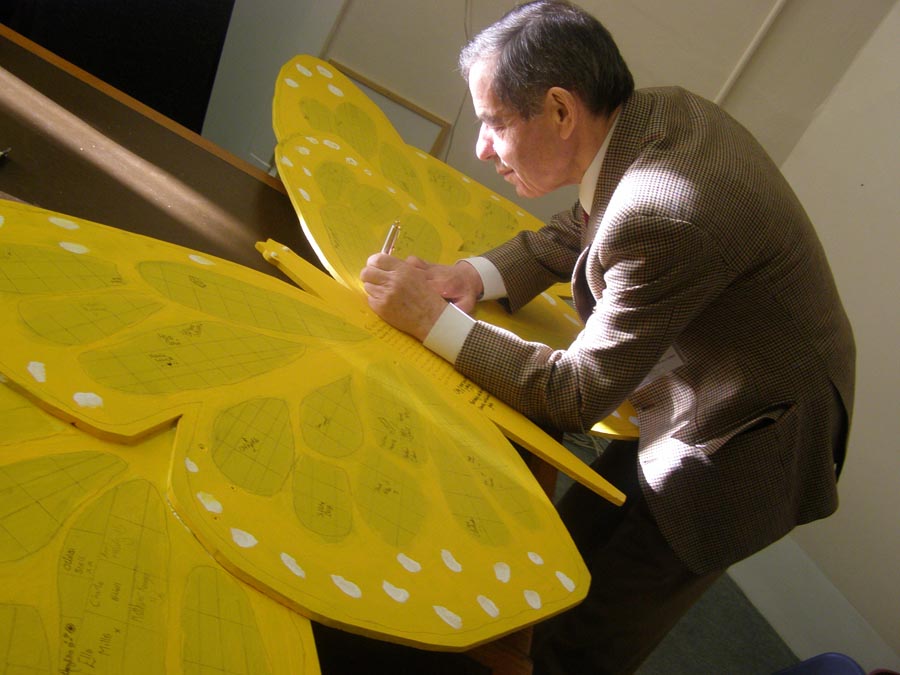Visit By Rudi Oppenheimer January 2012
28 January 2012
As part of Holocaust Week Teaching, Year 9 students were visited by Holocaust survivor Rudi Oppenheimer who spoke to them about his experience.
This year’s theme for Holocaust Memorial Day (Friday January 27th) is ‘Speak Up, Speak Out’, encouraging people to actively oppose racism and prejudice today.
Hearing in person from a Holocaust survivor gives young people the opportunity to learn more about the Holocaust and what can happen if racism is allowed to gain a foothold in society.
Rudi’s testimony was followed by a question and answer session
Rudi is pictured signing our butterfly.
As part of BRGS' continued commitment to Holocaust education, Year 9 are taking part in Houston Museum's Butterfly Project.
To commemorate the 1.5 million children who perished in the Holocaust, the Butterfly Project organised by Houston museum is putting together an exhibition of 1.5 million butterflies which our Year 9 are contributing to.
BRGS' students have created a butterfly which contains the signatures of all of the staff and students. Rudi Oppenheimer, our Holocaust survivor kindly added his name to our butterfly which will be displayed in school as a permanent memorial, as did author Sophie McKenzie when she visited BRGS.
Visit By Rudi Oppenheimer January 2012
RUDI OPPENHEIMER
Rudi was born in 1931 in Berlin and lived there with his parents and his older brother Paul until he was four years old.
His father worked at the Mendelsohn Bank in Berlin and managed to obtain a transfer to the Amsterdam branch in 1936. Before they moved to Heemstede in Holland, he lived for six months in Britain with his mother and brother, although his father didn’t join them. It was here that his sister, Eve, was born.
In May 1940 German troops invaded Holland, and by October 1942 Jews in Amsterdam were being rounded up and deported from the city. Rudi and his family, who had lived in Amsterdam since May 1942, managed to avoid deportation for the time being because his father was working for the Jewish Council. This gave them temporary exemption from deportation.
In June 1943, Rudi and his family were rounded up and sent to the transit camp Westerbork, situated in the north-east of Holland, not far from the German border.
Rudi’s father had registered Eve as a British subject with the Swiss embassy in Amsterdam in June 1942, because Eve had been born in the UK. Rudi`s family were now classified as “Exchange” Jews which meant that they might be exchanged for Germans interned by the allies and were to be exempt from measures taken against other Jews.
This status allowed Rudi and his family to remain in Westerbork until February 1944, when, after spending 7 months in the camp, the Oppenheimer family were deported to Bergen-Belsen in Germany. Rudi was just 12 years old.
As Exchange Jews, Rudi and his family received certain privileges in Bergen-Belsen: they lived in separate compounds from the other prisoners; they didn’t have to wear the striped uniforms that other prisoners were forced to wear, they didn’t have their hair shaved and they were able to keep their luggage. Nevertheless, during the winter of 1944/1945 Rudi and his family suffered dire living conditions. In January 1945, Rudi`s mother fell severely ill and died. Just two months later Rudi’s father also fell ill and died.
On 10 April 1945 Rudi and Paul left on the last train to leave Bergen-Belsen. After travelling for 14 days they awoke on the train to find that the SS guards had gone; Rudi, Paul and Eve, recognised soldiers from the Red Army and realised that they had been liberated. They managed to get to Leipzig with the help of the Russians, and from here they began their return journey to Holland. In June 1945, almost exactly two years after their deportation from Amsterdam, they arrived in Maastricht.
The Oppenheimers had a relative in England, so it was here that they headed to join their uncle and aunt, in London. Eve arrived in the United Kingdom in September 1945, followed by Rudi and Paul in November.
Rudi is now retired and talks regularly about his wartime experiences in schools and universities all over the country.
Rudi’s testimony can also be found in the following books:
- From Belsen to Buckingham Palace, by Paul Oppenheimer,
- Paul’s Journey, produced by HET and the NUS,
- Survival: Holocaust Survivors tell their story, by Beth Shalom,
- Zachor: Child Survivors Speak, by Stephen Smith
Other survivor stories: www.het.org.uk/index.php/survivor-stories
© Holocaust Educational Trust
www.het.org.uk
Tags: News Archive 2011/2012



.png)